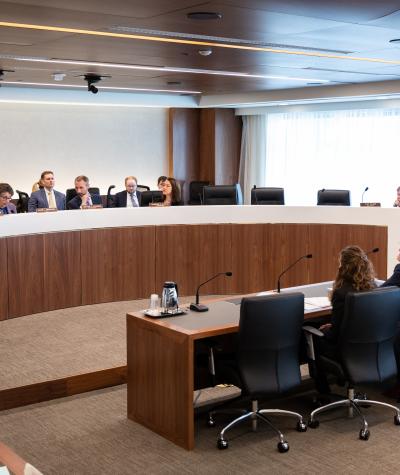After lacking a voting quorum since August, the Federal Election Commission (FEC) finally has enough commissioners again to carry out its obligations of enforcing, administering, and interpreting campaign finance law.
As the only government agency entrusted with those tasks, the FEC should take this opportunity to turn the page on its ten-year period of dysfunction, which has resulted in an explosion in secret spending and our politics increasingly rigged in favor of special interests.
In a new letter sent ahead of the FEC’s first public meeting with its restored quorum, Campaign Legal Center (CLC) is urging the FEC to immediately move forward on seven long-pending rulemaking matters.
The list does not cover every pending rulemaking, nor does it address the many important matters on the FEC’s enforcement docket. But taking action to craft new rules in these seven areas would provide much needed clarity on issues that continue to be directly relevant in the current election cycle.
The pending matters CLC highlights in its letter are:
- Clarifying on-ad disclaimer requirements for digital political ads: For more than eight years, CLC and many other groups have been urging the FEC to clarify how “paid for by” disclaimers—which have long been required for political ads run on TV—apply to digital political ads. Disclaimers provide critical information to the targeted audience, to watchdogs, to journalists, and to the general public about who is trying to influence voters, and it is long past time for the FEC to clarify those requirements in the digital sphere.
- Explaining how the ban on personal use of campaign funds applies once a candidate is no longer running for office: In 2018, an investigation by the Tampa Bay Times revealed a troubling trend of former candidates and officeholders leaving open, and dipping into, their old campaign accounts long after they stopped running for office. Shortly after that investigation was published, CLC asked the FEC to send a clear message to these so-called “zombie” campaigns by clarifying how the long-standing ban on personal use of campaign funds applies once a politician leaves office and is no longer a candidate. The FEC sent letters to some zombie campaigns but has not yet clarified and strengthened its rules.
- Clarifying that the ban on personal use of campaign funds applies to politicians’ leadership Political Action Committees (PAC): CLC and Issue One have documented how many politicians use their leadership PACs to bankroll spending at resorts, high-end restaurants, golf courses, and more while often devoting only a minority of spending to making political contributions to other candidates—the intended original purpose of leadership PACs. Such activity continues, and it is long past time for the FEC to clearly prohibit leadership PAC funds from being converted to personal use.
- Closing the list-swap loophole: Lists of supporters are highly valuable commodities for campaigns, parties, and outside groups like super PACs, but the FEC has allowed committees to secretly transfer those lists between one another if they claim the exchange was part of an equal value “swap.” The FEC should amend that regulation to ensure those transactions properly appear on campaign finance reports, just as other transactions already do.
- Instituting basic disclosure for parties’ big-money “cromnibus” accounts: In 2014, as part of the “cromnibus” spending bill, Congress created new special purpose accounts allowing the national parties to accept hundreds of thousands of dollars more from individual donors than was previously permitted. But the FEC has not written any rules implementing that law, so it is virtually impossible for the public to figure out how much any of these accounts holds, and to consistently track the flows of money in and out of them. The FEC should institute basic disclosure requirements for these accounts.
- Closing the cycle-change loophole that allows super PACs to strategically postpone revealing their donors: In recent years, some super PACs spending large sums on primary elections have exploited current law to strategically avoid disclosing their wealthy special interest donors until after those primaries are over. The FEC should take steps to close that loophole.
- Implementing transparency requirements for so-called dark money groups that run ads advocating for and against candidates: In 2018, a federal court invalidated an FEC rule that had allowed the sources of up to $769 million in election spending to stay secret, but the FEC has yet to write a new rule in its place. The FEC should fill that gap and write a rule that will ensure the transparency promised—but still not implemented—in the law.
Read CLC’s letter to the FEC here.
